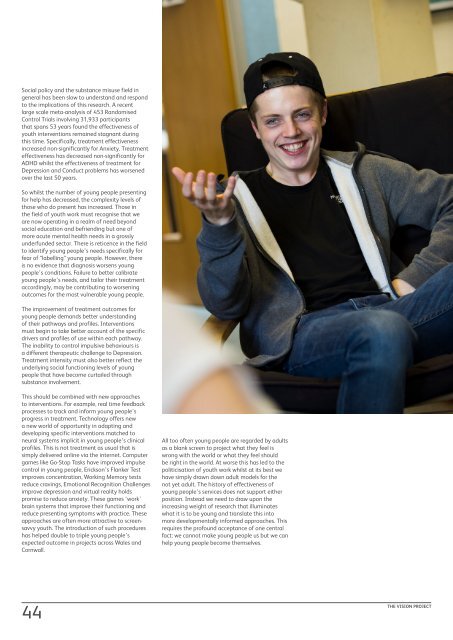The Vision Project
Throughout 2019, Developing Health & Independence (DHI), have been marking their 20th anniversary as a charity by looking to the future. Through articles, events and podcasts, they've asked people to answer the question of how we can achieve their vision of ending social exclusion. This collection of articles includes the contributions of experts from across public life and the political spectrum.
Throughout 2019, Developing Health & Independence (DHI), have been marking their 20th anniversary as a charity by looking to the future. Through articles, events and podcasts, they've asked people to answer the question of how we can achieve their vision of ending social exclusion. This collection of articles includes the contributions of experts from across public life and the political spectrum.
You also want an ePaper? Increase the reach of your titles
YUMPU automatically turns print PDFs into web optimized ePapers that Google loves.
Social policy and the substance misuse field in<br />
general has been slow to understand and respond<br />
to the implications of this research. A recent<br />
large scale meta-analysis of 453 Randomised<br />
Control Trials involving 31,933 participants<br />
that spans 53 years found the effectiveness of<br />
youth interventions remained stagnant during<br />
this time. Specifically, treatment effectiveness<br />
increased non-significantly for Anxiety. Treatment<br />
effectiveness has decreased non-significantly for<br />
ADHD whilst the effectiveness of treatment for<br />
Depression and Conduct problems has worsened<br />
over the last 50 years.<br />
So whilst the number of young people presenting<br />
for help has decreased, the complexity levels of<br />
those who do present has increased. Those in<br />
the field of youth work must recognise that we<br />
are now operating in a realm of need beyond<br />
social education and befriending but one of<br />
more acute mental health needs in a grossly<br />
underfunded sector. <strong>The</strong>re is reticence in the field<br />
to identify young people’s needs specifically for<br />
fear of “labelling” young people. However, there<br />
is no evidence that diagnosis worsens young<br />
people’s conditions. Failure to better calibrate<br />
young people’s needs, and tailor their treatment<br />
accordingly, may be contributing to worsening<br />
outcomes for the most vulnerable young people.<br />
<strong>The</strong> improvement of treatment outcomes for<br />
young people demands better understanding<br />
of their pathways and profiles. Interventions<br />
must begin to take better account of the specific<br />
drivers and profiles of use within each pathway.<br />
<strong>The</strong> inability to control impulsive behaviours is<br />
a different therapeutic challenge to Depression.<br />
Treatment intensity must also better reflect the<br />
underlying social functioning levels of young<br />
people that have become curtailed through<br />
substance involvement.<br />
This should be combined with new approaches<br />
to interventions. For example, real time feedback<br />
processes to track and inform young people’s<br />
progress in treatment. Technology offers new<br />
a new world of opportunity in adapting and<br />
developing specific interventions matched to<br />
neural systems implicit in young people’s clinical<br />
profiles. This is not treatment as usual that is<br />
simply delivered online via the internet. Computer<br />
games like Go-Stop Tasks have improved impulse<br />
control in young people, Erickson’s Flanker Test<br />
improves concentration, Working Memory tests<br />
reduce cravings, Emotional Recognition Challenges<br />
improve depression and virtual reality holds<br />
promise to reduce anxiety. <strong>The</strong>se games ‘work’<br />
brain systems that improve their functioning and<br />
reduce presenting symptoms with practice. <strong>The</strong>se<br />
approaches are often more attractive to screensavvy<br />
youth. <strong>The</strong> introduction of such procedures<br />
has helped double to triple young people’s<br />
expected outcome in projects across Wales and<br />
Cornwall.<br />
All too often young people are regarded by adults<br />
as a blank screen to project what they feel is<br />
wrong with the world or what they feel should<br />
be right in the world. At worse this has led to the<br />
politicisation of youth work whilst at its best we<br />
have simply drawn down adult models for the<br />
not yet adult. <strong>The</strong> history of effectiveness of<br />
young people’s services does not support either<br />
position. Instead we need to draw upon the<br />
increasing weight of research that illuminates<br />
what it is to be young and translate this into<br />
more developmentally informed approaches. This<br />
requires the profound acceptance of one central<br />
fact: we cannot make young people us but we can<br />
help young people become themselves.<br />
44<br />
THE VISION PROJECT




